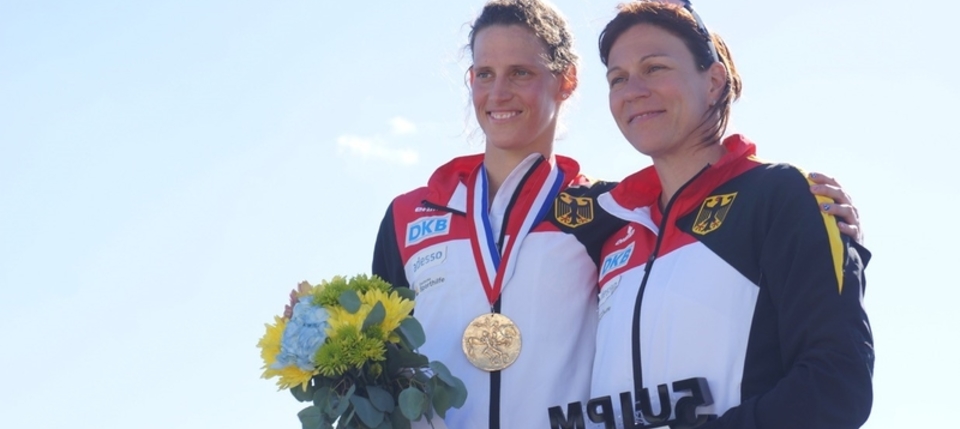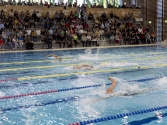Coach class: Kim Raisner (GER) on the endless quest for improvement

In the first part of a new series, Kim Raisner (GER) talks about her coaching career and her role as head coach of the German Modern Pentathlon Federation (DVMF).
At the end of an Olympic Games, a lot of participating athletes find themselves doing one of two things.
They either start looking forward to the next Olympic Games, or their minds turn to what they will be doing instead of competing at the next Olympic Games.
In the case of Kim Raisner of Germany, a 5th-placed finish at Athens 2004 at the age of 31 probably left her with a lot of conflicting feelings. But it’s likely that Beijing 2008 was not at the forefront of her mind.
It’s definitely fair to say that training a young athlete to win the Women’s Individual gold medal at Beijing 2008 was not an outcome she had envisaged.
Twelve years on from the triumph of Lena Schoeneborn (GER) in those Games, her coach now oversees both the female and male elite groups in German Modern Pentathlon, putting into practice all the lived experience of her athletic and coaching careers and moving with the times to adapt to the changing role of the coach in the Olympic Games’ most demanding and complex sport.
Q: As a pentathlete, how many different coaches did you work with and what did you learn from them?
A: For most of my career, we had quite a high turnover of coaches because the Women’s Modern Pentathlon was not in the Olympic Games and many of our head coaches ended up becoming men’s head coach because they could be involved in the Olympics.
Sometimes it’s good to have a new coach because it brings a fresh view, but I think this is one of the reasons I started to do a lot of training on my own. Rudi Trost was my coach for a long time – he was a great coach, he has written books on Modern Pentathlon – and also Iri Zlatanov who is now men’s coach.
I think you can learn from every coach. You learn what’s going wrong and you learn from your mistakes, and all of them brought me forward. They all put a stamp on you and help you to develop. Iri, for example, he changed my pistol grip to the French grip and then changed back, and I learned a lot from that. But the continuity with the women only really started when I became a coach myself.

Q: When did you decide that you wanted to become a coach, and who did you ask for advice?
A: Rudi was also coach for Berlin and wanted me to follow and take over the training centre there, but it was too early for me, I was still trying to qualify for Athens and the pressure was too much.
He appointed somebody else to that job and there was a new centre in Potsdam, close to Berlin, and they asked me if I wanted to get involved as a regional coach after I stopped my career. They made me an offer to start in 2005 after the Olympic Games in Athens.
At that time, I had a C licence for coaching Modern Pentathlon and the B licence was obligatory to get the job; I also wasn’t sure I wanted to do such a job. I was thinking, as we say in Germany, do I have the hand for this?
In Germany we have a regional competition for U11 kids, the Mini Cup - I won my first Mini Cup a long time ago – and I was invited to go with some kids from Berlin and support them. That situation gave me so much! When you tell kids something and they listen and put it into practice, it’s a feeling like no other. I thought “maybe it wouldn’t be so bad, I think I’m going to try this”.
I started at the regional base in Potsdam and after half a year, my fellow athletes, Lena and Eva Trautmann, asked me if I would like to be the national women’s coach. I thought, I was too fresh, but I also thought ‘what can go wrong, can it be worse than the coaching situation we had before? I am used to organising a lot of camps on my own’.
I thought it was worth a try, and I told myself I would try not to make mistakes made by others before.
Q: What steps did you take to gain coaching qualifications, and is it a process of continuous learning?
A: Now I have my A licence, the highest level in Germany. I also did physiotherapy after school and went to university and studied Sport Science and Organisation (did my Diploma), and I also got my C licence for Riding training.
I think you can always learn more, and a coach should be informed. I go to seminars and it’s always good to know what others are doing and how to deal with changes. It’s always possible to do more to help athletes improve. How can we adapt? What can we do? It’s not just a gut feeling, it needs to have a base in science. A lot of experience helps of course. People change, communication changes and you have to adapt sometimes.

Q: What was the first thing you achieved as a coach that made you proud?
A: Actually, I can say Lena Schoeneborn! I started on a voluntary basis as a women’s coach alongside my other work as a regional coach, and she started to get really successful. She won a silver medal at the World Championships in 2007 and I thought if she would win a medal in Beijing then I could immediately stop my coaching career, because it couldn’t get better than that!
Then she won gold.
It was overwhelming, and I still cry when I see the pictures. To say it made me proud would be a big understatement.
I was offered the men’s job later after that – to do both at the same time – and I said no. It wasn’t until after Rio 2016, I think, that I took over as a head coach.
Q: What are the other highlights of your coaching career so far?
A: We had a lot of overwhelming moments, and every World Championships medal is very special. I was very lucky to have an athlete so good continuously over the years, even when the format changed.
You know what, the zero ride that Lena had in Riding at Rio 2016 was also a big memory. It also makes me cry even though it’s not a positive thing.
Another highlight was when I got nominated as Coach of the Year in the German National Sports Awards, I think it was 2009. Lena made a speech and that meant so much to me.
Q: What do you think are the three most important characteristics in a coach?
A: Communication, creativity and motivation. By motivation I mean the hunger to learn.

Q: In what ways does your own pentathlon career help when it comes to coaching?
A: It helps when you’re trying to avoid mistakes. I have been through it and I made my mistakes, you can’t be always aware of what’s going to happen but you can tell young athletes what can go wrong – and I know how difficult things are.
At the start maybe I was too close, I could still feel how hard the training was, I was thinking like an athlete, whereas now I can differentiate more. Sometimes you have to be the a*****e – you have to be hard on them.
I think the athletes trust me. Not every athlete is a good coach, but they believe what I say because I’ve been through it, and this really helps. It’s an advantage because Modern Pentathlon is special and coaches from outside the sport and who do individual disciplines, they need to learn for two to three years how our sport (Pentathlon) works.
Q: How has the role of the coach in Modern Pentathlon changed over the years?
A: You’re no longer just a training expert, you have to be a psychologist. Coach always together with athletes and now you have to be a motivator, an organiser, an administrator – that side of it changed a lot and there is a lot more paperwork.
Big data is a thing now, too. You have to get fast information and sort out the most important information. Not everything on the internet is right – if you don’t have the right base you can’t be an expert. Athletes read things that are not always helpful.
I do training programmes and seasonal planning and periodisation, but it’s a lot more. It’s not that one coach is doing all five disciplines, you need to rely on the specialist experts. You need individual fencing coaches, for example, swimming and running coaches doing both, but some need a specialist more than others. I may be a good riding coach but will never be as good as the riding coach who taught me, he is a specialist.
When I started coaching, I introduced psychologists. There is also regeneration, nutrition is getting better now, we don’t have dedicated physio at all competitions and camps, but it’s more than we had before. There is also strength & conditioning in the gym here. This is like the sixth discipline it belongs to a training plan and it wasn’t like that in my time.
Q: What would you say to recommend coaching to a pentathlete who is considering it?
A: I think it’s good. It’s a hard job and it’s got to be a passion. In Germany it’s hard to find coaches in our sport, it’s not so well paid and not very secure.
Modern Pentathlon is not a big sport and that’s why it can be difficult, but if somebody really wants it and has the passion, I say OK, start with the kids and see if you like it. They think it’s easy but soon you realise you have to be the first and the last person at every session. I tell them to be positive about it, I try to convince people and I show them the way to do it.
Q: Describe your perfect day as a pentathlon coach…
A: Right now, I think my perfect day would be just any day when we can have a normal camp, attend a normal competition – anything like that!
With the elite group preparing for the Olympics, to have that normality every day would be fulfilling for me. Modern Pentathlon is always changing and actually I like that somehow - sometimes it’s stressful but you feel super good.
The perfect day for me would be one day of competition when you have success. It doesn’t have to be a medal, even just with kids, if there is a personal best and you see the happiness in their face and they come to you and say ‘what you told me worked!’
Sometimes it’s a look, sometimes it’s a word. If one of these things happens and you get that positive feedback, it’s perfect.
- Visit the Coaches section of the UIPM Educational Platform to help you kickstart or continue your coaching journey – resources include publications, videos, scientific articles and coaching essays






